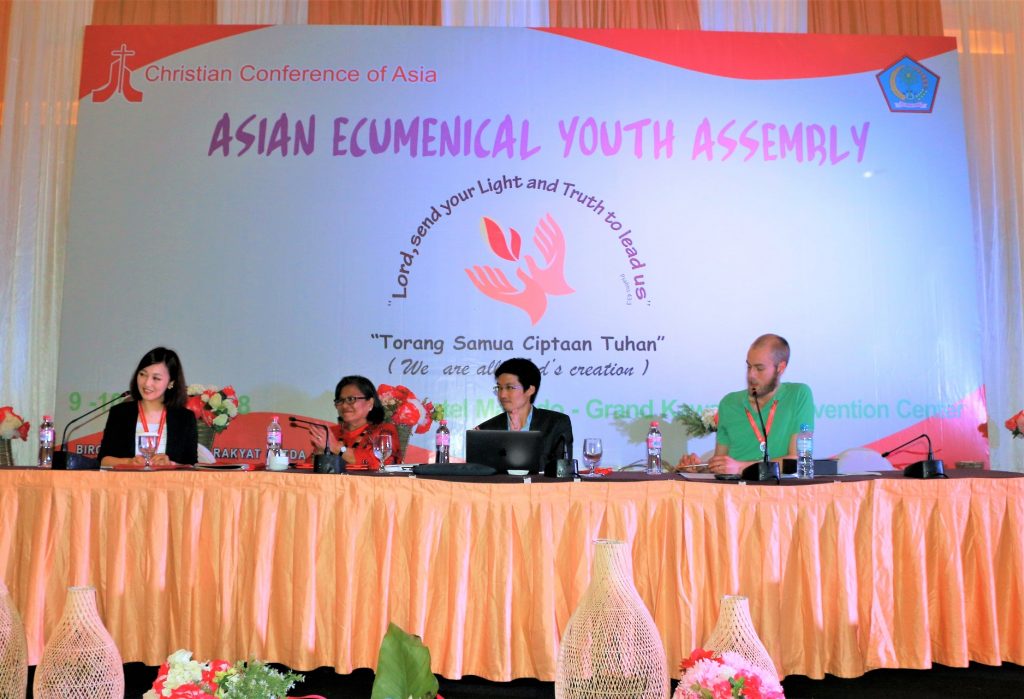“Young Asians must look at changing family values in Asia”, panellists urge at the AEYA
 Three panelists speaking on a session on “Changing Family Values and Cultures in Asia: Intergenerational Voices,” echoed similar concerns that traditional family values nurtured over the centuries in Asia have changed, and nuclear family system has been disappearing in many cultures in Asian countries.
Three panelists speaking on a session on “Changing Family Values and Cultures in Asia: Intergenerational Voices,” echoed similar concerns that traditional family values nurtured over the centuries in Asia have changed, and nuclear family system has been disappearing in many cultures in Asian countries.
“The image of a family itself has been changed in Japan”, said Dr. Sawako Fujiwara. “A typical family today in Japan is like this: they are a dual-career couple. Harassments against working mothers, single parents and pregnant women exist. The young couple don’t live together with their parents or relatives, and at the same time when parental care becomes a problem, they are always looking for a nursery school for their children. And in today’s Japanese situation, it’s unbelievably difficult.”
Sawako Fujiwara, a full-time lecturer and University chaplain at Tohoku Gakuin University is also a feminist theologian. She said that “the Japanese context altogether puts a heavy burden on the shoulders of women”
She also tackled contemporary issues during her presentation: The problem of “karoshi” (deaths related to overwork), is happening due to the ‘Japanese Agenda’ that wants to increase women in the workforce as a matter of money, not good faith, from “powerful male elites.”
Lawrence Chong, an active member of the Roman Catholic Church’s Focolare Movement in Singapore said about the same kind of changes that are happening in families across Asia. He zeroed in on some changes in the family landscape.
Within 10 years, he said, traditional families will make up less than 50 percent in Asian countries. Year 2018 is forecasted to see over 50 percent of Asia-Pacific’s population in urban areas; resulting in soaring prices for housing. Health costs will be a burden in Asia because of increasing of cancer, stroke and dementia in the next decade.
He also cited a study saying that between 2015 and 2034, the older population will grow by 22 percent in East Asia, posing an imminent labor force issue. Politics in these parts also cannot be ignored.
“The centrality of family and traditional family values is undeniably changing in Asia. However, family is still very deep in our culture as Asians.”, said Dr. Henriette Hutabarat Lebang, General Chairperson of the Communion of Churches in Indonesia. “She added, “family is an enduring character of Asian cultures. Showing some examples from Indonesia, she said Asians are also very community-oriented, practice intergenerational cohabitation, value extended families, respect older people and see a mutual responsibility for the care of parents and children”.
“Are we still community-oriented or changed?” she then asked, explaining that the impact of globalization on Asia was a cause to reexamine long-held assumptions on Asian culture.
“The market economy has introduced high competition. There is a shifting of value in Asian society. Thus, people have been increasingly individualistic, exclusivist, and greedy. Face-to-face communication has taken a backseat because of new technology”.
She was on the opinion that amidst all these problems, we must hold on to some of our values. “We still have some positive values and we need to hold this: Respecting differences, family ties, for example. If we miss this one, we will do the mistake of many parts of the world”, she told the Asian youths.
“Are we embracing a disposable culture?”, Dr. Fujiwara further asked this and reminded the youths to ponder on it. She shared that there is pleading for reforms in family values and work culture in Japan.
She added that she herself had experienced overwork and severe depression at the age of 22; and sharing of her past experiences are helpful now to enrich her ministry with the young people in Japan.
Lawrence Chong proposed some ways to respond to the changing character and needs of young people of Asia today. Among others, he said, parents must increase their engagement with their kids, find “new ways to love” and appreciate the new way of family. “If you do not engage the child, you lose the child,” he said.
“Parents nowadays are under stress, under a lot of pressure,” he added. “In my case, we have a cell group of new families, where we share new ideas, how we share our time. Given all the problems, we must revive ourselves in faith. Schedule time to create happiness – affirm and share time with one another.
Traditional power structures are also bound to change because of the cultural landscape, said Chong. “Gender equality has to happen. Women are increasingly accessing information, quality education. Some places in Asia are moving. It is a complex situation, but … Asia is really moving.”
The session was chaired by Andrew John Traeger of the Lutheran Church in Australia.










